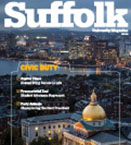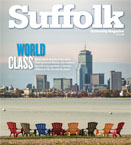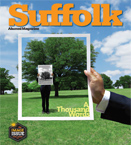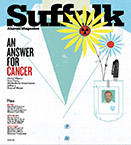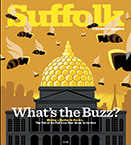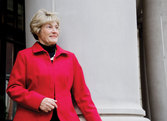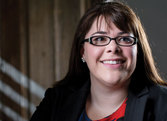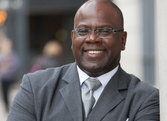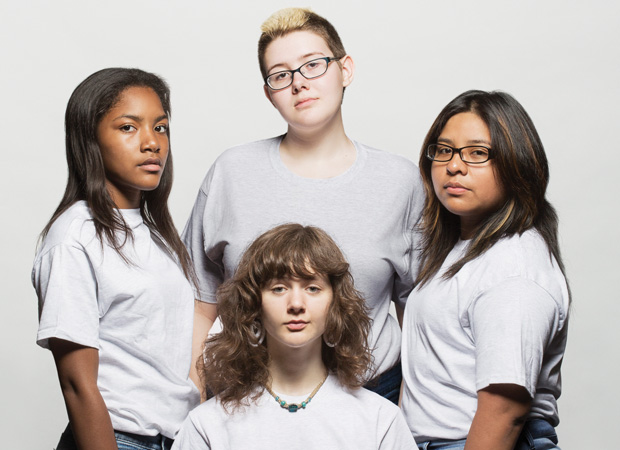
Can We All Just Get Along?
At RAM Academy, new students face the tough questions about college and life
By Reneé Graham
“If your ancestors came to the United States by force, take one step back. If there were more than 50 books in your house growing up, take one step forward. If you’ve ever felt unsafe because of your sexual orientation, take one step back.”
As Tiffany Martinez, a Suffolk senior, recites these statements, 13 young people on the cusp of their college careers stand in a line, their hands clasped. Every sentence yields movement and an uneasy tension as the participants try to maintain their grasp, reluctant to break their original formation. With each step forward or back, the line undulates until it breaks, staggering the students at different points on the grassy lawn of a bucolic island in Boston Harbor. “If you believe you were denied employment because of your race, gender, or ethnicity, take one step back. If you’ve ever felt unsafe because of your gender identity, take one step back,” Martinez says. “Notice who is with you; notice who is not.”
This intense exercise is called a “privilege walk,” and the participants are all incoming Suffolk freshmen. It was one of the centerpieces of Ram Academy 2014, part of the University’s freshman orientation events that, for the first time, included a four-day program on multiculturalism and social justice.
As they will in college, students live, eat, and socialize with each other, deepening the camaraderie and interactions beyond the more formal settings.
“We hope students will come out of this with a beginning understanding of social justice in the world and what multiculturalism means to them, and at Suffolk,” says Jacinda Felix Haro, director of the University’s Office of Diversity Services, which hosted the event. “We like to say that this sets the stage for what they’ll be learning during their four years of college and beyond.”
That’s exactly why Kaelie Martin, who needed time to gather her thoughts after the privilege walk, wanted to participate. What hit home for Martin was a statement about having been in an abusive relationship—which she was at age 15.

Kaelie Martin
“When I stepped back and looked around, the fact that there was nobody around me made me very uncomfortable,” she says, about an hour after the exercise. “But at the same time, I really learned from that, and I don’t think before this trip I would have been able to easily announce that that was something that happened to me. But because of the people here—they’re so open and accepting—it’s just so much easier to be myself around them.”
Don’t Yuck the Yum
The University’s two Ram Academies (the other focused on leadership) were voluntary and open to all incoming students. For the multiculturalism and social justice segment, there was space for 30 students, but Haro says the final group of 13—seven women, five men, and one person who identifies as gender neutral—proved to be an ideal number. “I’m actually glad this is a smaller group, because I think we can have deeper conversations,” she says, “and these can be tough topics sometimes.” This experience is meant to lay the groundwork for all that lies ahead, says Haro, who sees this academy as the start of important, life-shaping conversations about race, gender, and identity.
With such topics as white privilege and “micro-aggressions,” Ram Academy promised to be unlike the freshmen orientation that all new students at Suffolk attend in September. Once students arrive at the Thompson Island Outward Bound Education Center, a 20-minute ferry ride from downtown Boston, they settle into the dorm rooms where they will spend two nights, then make their way to one of the island’s meeting spaces. Right off, they are asked to do the unthinkable—leave their smartphones on a cabinet, well beyond their reach. That means the academy facilitators—staff members Haro, Jesse Beal (assistant director for the Office of Diversity Services), and Kelli Connors BA ’10 (budget and operations coordinator for Orientation and New Student Programs), along with Suffolk students Martinez ’15, Amy Kerr ’16, and Crystal Chandler ’15—won’t have to compete with texts, tweets, or games for the students’ attention. “It’ll be OK. You’ll be fine,” Haro assures them. After some separation anxiety, and with their iPhones and Androids silenced, the teens return to their seats.
Posted near the front of the room are handwritten ground rules such as “Don’t yuck the yum” (deride the pleasures of others), “Assume best intentions,” “One diva, one mic” (no side conversations while someone else is speaking), and “Challenge yourself.” It’s this last tip that has brought Xochitl Martinez, 18, here. A native of Queens, N.Y., she came to Ram Academy to “go deeper into issues you wouldn’t normally address on campus.” She was not disappointed, even when discussing sensitive issues among people she had just met. “To an extent, it can get uncomfortable, but also I think it’s an opportunity to grow because you gain different perspectives. Even with people you do trust, you can’t always tell them everything, and sometimes talking to strangers is a little easier. At least you get to tell your side of the story and they get to see it from your perspective,” she says. “They get a view of you in a different light. It’s a different way to gain a lot of information on other people. And you learn a lot about yourself.”
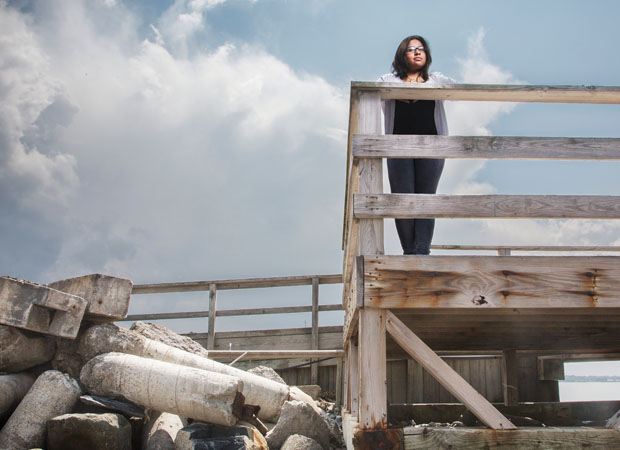
Xochitl Martinez
That’s what prompted Martinez to take a step back during the privilege walk when the group was asked whether any of them had ever been sexually harassed.
“It’s a memory I’ve suppressed since I was really young when it happened. My parents don’t know about it,” the communications major says. “So when it was brought up during the [privilege walk], it was hard for me to accept it, but I just couldn’t deny it any more, even if I wanted to.”
For some students, the privilege walk was a defining experience of the retreat. Rhi Chapman, 18, of Readfield, Maine attended to further an interest in social justice, and viewed the academy as an opportunity "to get involved with the Suffolk community."
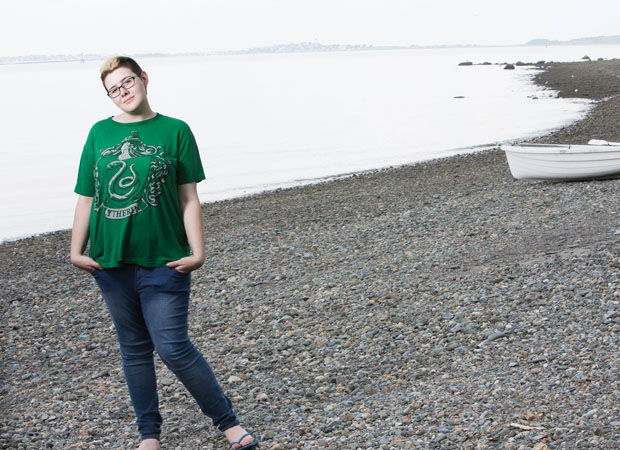
Rhi Chapman
“I want a better understanding of other people. I hope to make some friends, people I can count on to be good people for me to be around when I’m in the city." At the academy, Chapman says, "It’s somehow easier to talk and share personal details with people who don’t have any preconceived notions about you." Yet Chapman, who identifies as gender neutral, was most surprised by the results of the privilege walk. “I see myself as someone with a lot of privilege, but I was pretty far back—I was the fifth-farthest back. It made me think of how I think of myself in relation to others, and how they see me.”
When the privilege walk is over, Beal tells the students, “Some of those identities are hard to claim. Some of those identities were hard for me to watch you claim. I was so surprised—there were times when people stepped forward or backward, and it hurt me to see someone have to claim that identity.”
The overall experience was just as jarring for those who found themselves far in front of their fellow students. One young man says, “When you’re the only one stepping forward, it doesn’t feel good either.” He grew up, he says, in an affluent, predominantly white Vermont town, “a sheltered community where everyone has two cars and a home on the beach. I never thought that I was privileged because that was just normal life.” Another, who was also near the front, says that he never considered the privileges he enjoys as a white male to be special “until I realized just now how many people don’t have them and how that can affect their lives.”
Chandler, one of the student facilitators, tells the teens, “The point isn’t to make you feel bad or embarrassed about your privilege based on your gender, race, ethnicity, or whatever it may be. It’s to make you aware of it. That’s the first step. If you’re not aware of it, you can’t do anything about it.”
Beyond College
The discussion then turns to “microaggressions,” defined as casual insults, often unintentional, toward any socially marginalized group. As an example, Mercedes Wallace, 18, offers a story about attending church and having a woman she just met ask whether Wallace and her sister had the same father. Wallace suspects the woman assumed black siblings would have different fathers. “Why wouldn’t we have the same dad?” Wallace says. “And we do, by the way. I’m not even sure what she was trying to say.”

Mercedes Wallace
How eager her fellow students are to share their stories—and listen to others—is a revelation to Martin. Having grown up in Lebanon, Connecticut, a small town she describes as having “more cows than people,” with a mostly white population, she worried whether she would feel welcome at Ram Academy. “When I came into the group at the beginning, I felt very uncomfortable because of the privilege I have being a white cisgendered [someone whose gender identity matches his or her birth gender] female. I thought I would not be able to voice my opinion as much as I would want to, because I did not have the right to,” she says. “But the more that I’ve been talking to the people here, and the more I’ve experienced, I’ve been connecting more, and I feel like I can be more open with my opinions. People here care about what I have to say.”
Wallace, of Cambridge, was already considering Suffolk when she heard about Ram Academy. It “pulled me closer” to the University, she says, because the program’s social justice goals were similar to a class she had taken at her hometown’s Cambridge Rindge and Latin School. “The class I took was preaching and advocating respect, and it just grew on me. It made me more aware of what’s going on and [of] the inequalities around me. So a lot of the things we’ve talked about here are things we talked about in that class.”
A psychology major, Wallace also hopes her experiences with the academy will help shape her career path. “I feel like this can help me determine if I just want to be a psychologist and help children, or do social work and help low-income families,” she says. “I don’t know if I want to be an activist or just a psychologist, but I think some of the things we’re talking about here can help me decide.”
As the day winds down, the students seem mentally exhausted. Yet even as they were separated during the privilege walk by each painful revelation, they also appear united in sharing their individual truths, some never before acknowledged aloud, and are brought closer by a clearer understanding and respect or each other’s differences. Fledgling friendships have been forged, and 13 young people, new to Suffolk and the burgeoning adulthood of college life, have begun the difficult, but necessary, work of challenging their own assumptions.
“After being here, people have an idea of who you are, and I think it will be easier to transition into college with the connections I’ve made,” Martinez says. “I’ve gotten to know these people—and they’ve gotten to know me—on a whole different level, and it’s been an amazing experience.”
What Haro hopes the students gained during Ram Academy are social tools to guide them, not only in their freshman year but also through their college careers and beyond. No single retreat, she says, can instantly remake long-established beliefs about groups outside of one’s own gender, ethnic, or racial make-up. But it’s an important first step for many of these students now equipped with lessons they too can share with their peers.
“Beyond college—that’s always the goal. We want to make sure students will graduate with competencies that will make them successful when they go into the workforce,” Haro says. “We hope the University will have students engage in these meaningful conversations throughout their four years at Suffolk.”
